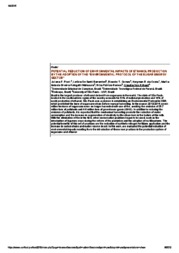Potential reduction of environmental impacts of ethanol production by the adoption of the "environmental protocol of the sugar-energy sector".
Potential reduction of environmental impacts of ethanol production by the adoption of the "environmental protocol of the sugar-energy sector".
Author(s): PICOLI, J. F.; BARRANTES, L. D. S.; GOMES, R. T.; COSTA, K. R. da; MATSUURA, M. I. da S. F.; RAMOS, N. P.; FRIHAUF, C. von
Summary: Brazil is the largest producer of ethanol derived from sugarcane in the world. The state of São Paulo, located in the southeastern region of the country accounts for 51% of national production and 16% of world production of ethanol. São Paulo was a pioneer in establishing an Environmental Protocol in 2006, which prohibited the burn of sugarcane straw before manual harvesting. In the season 2013/2014, seven million hectares of sugarcane were no longer harvested with use of fire, avoiding the emission of 26.7 million tons of pollutants and 4.4 million tons of greenhouse gases (GHG). In addition to reducing the emission of pollutants, it is expected that the mechanical harvesting promote the reduction of water consumption and the increase in cogeneration of electricity by the straw burn in the boilers at the mills. With the elimination of fire in the field, other conservation practices began to be used, such as the introduction of legumes crops during the reform of the plantation and the adoption of notill systems. The potential benefits of this set of practices are the reduction of synthetic nitrogen fertilizers application and the increase in carbon stocks and water reserve in soil. In this work, we evaluated the potential reduction of environmental impacts resulting from the introduction of these new practices in the production system of sugarcane and ethanol.
Publication year: 2015
Types of publication: Abstract in annals or event proceedings
Unit: Embrapa Environment
Observation
Some of Embrapa's publications are published as ePub files. To read them, use or download one of the following free software options to your computer or mobile device. Android: Google Play Books; IOS: iBooks; Windows and Linux: Calibre.
Access other publications
Access the Agricultural Research Database (BDPA) to consult Embrapa's full library collection and records.
Visit Embrapa Bookstore to purchase books and other publications sold by Embrapa.

